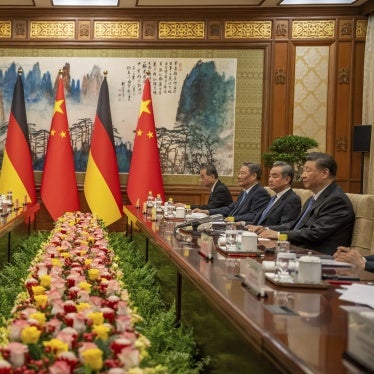Philippine President Benigno Aquino III visits Japan this week for the first time since he took office on June 30, to attend his first Asia Pacific Economic Cooperation (APEC) meeting in Yokohama. As human rights are a pillar of Japan's foreign policy, Prime Minister Naoto Kan should express Japan's concern about the ongoing extrajudicial killings in the Philippines carried out with near complete impunity, and make clear that failure to address the killings seriously will jeopardize the bilateral relationship.
The two leaders had their first official meeting on October 29 in Hanoi, where they agreed to strengthen bilateral relations. Japan pledged to lend the Philippines 40.8 billion yen (21.4 billion peso) for road repair and preservation. The sensitivities of the first meeting are now in the past, and Japan should ensure that human rights are to be a central element of the relationship.
Since 2001, security forces have been implicated in the killing of hundreds of leftist politicians, political activists, clergy and journalists. In just one example, Pastor Andy Pawikan was stopped by a group of about 20 soldiers as he walked home while walking home from church in May 2006, in the province of Nueva Ecija, Central Luzon, with his wife, 7-month-old daughter, and three women from the church. The soldiers allowed the women to continue, but detained the pastor, who was carrying the baby. After 30 minutes, the women heard shots. After some time a group of soldiers delivered the child to the house of the pastor's mother-in-law, covered in blood but otherwise uninjured. The next day, villagers found Pastor Pawikan's body. The military has alleged that several pastors of the United Church of Christ of the Philippines are sympathetic to the communist movement.
This case is one of many that prompted Japan to join the international chorus that pushed the Philippines to reduce the number of extrajudicial killings. Japan used the Universal Periodic Review of the Philippines before the United Nations Human Rights Council in 2008 as an opportunity to ask the government about the effectiveness of investigations into extrajudicial killings and the measures it was taking to end them. The number of killings dropped substantially in response to the international pressure, in which Japan, one of the biggest donors to the Philippines, teamed up with the United States, the European Union, and several other countries.
Although there has been a drop in killings, those responsible still largely go free. Since 2001, only eleven perpetrators of six extrajudicial killings have been convicted. Neither the police nor the Justice Department have properly investigated the murder of Pastor Pawikan, though four years have passed since his death. Dozens of members of the police, as well as several local politicians, are now being tried for the killing of 57 people in November 2009, but 115 suspects remain at large, including four soldiers.
Unfortunately, extrajudicial killings have continued under the Aquino administration --more than 20 apparently politically motivated killings have occurred since Aquino took office and security force members continue to be implicated in several of these cases. In three separate incidents in July, unidentified gunmen shot and killed three teachers as they were traveling to or from school in Central Luzon and Bicol. In one case the gunmen were dressed in military fatigues. The victims were all members of the Alliance of Concerned Teachers party-list, which the military has accused of being a front for the communist insurgents. Perpetrators have not been identified in any of these three cases.
Japan for years has financed projects to enhance the capabilities of the police in the Philippines to investigate serious crimes. The Japanese government should be concerned about the lack of accountability from the security forces. Prime Minister Kan should advise President Aquino that the Japanese government will carefully monitor the progress of prosecuting those responsible for human rights violations, particularly extrajudicial killings, to ensure justice is done.
Kanae Doi is director of the Japan office at Human Rights Watch.







